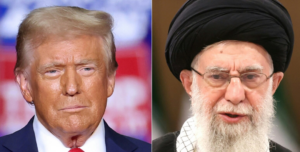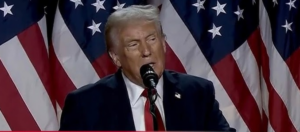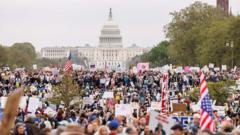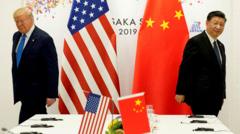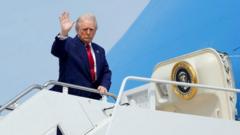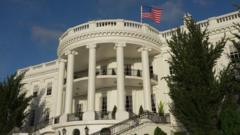Direct talks between the United States and Iran are set to occur, as President Trump alerts of serious consequences if an agreement is not reached. While Iran's Foreign Minister confirms a preference for indirect negotiations, both nations face a pivotal moment regarding nuclear capabilities and regional security.
New Frontiers in Diplomacy: US and Iran Engage in Direct Talks on Nuclear Deal

New Frontiers in Diplomacy: US and Iran Engage in Direct Talks on Nuclear Deal
President Trump announces high-level discussions with Iran aimed at potentially negotiating a new nuclear agreement amid escalating tensions.
The United States is poised to engage in "direct talks" with Iran concerning a potential new nuclear deal, as revealed by President Donald Trump. The discussions, planned for Saturday, have been characterized as high-level negotiations that could lead to significant developments. Trump indicated that failure to reach an agreement could have dire repercussions for Iran, stating, "It'll be a very bad day for Iran" if negotiations do not conclude favorably.
This revelation comes after a White House meeting with Israeli Prime Minister Benjamin Netanyahu, who has consistently advocated for military action against Iran to ensure it does not acquire nuclear weaponry. Trump warned that Iran's possession of nuclear arms would be unacceptable, emphasizing the need for a successful negotiation or facing detrimental outcomes for Tehran.
While the specifics of the upcoming talks remain undisclosed, including the officials involved, Iran has yet to officially acknowledge the nature of the discussions since Trump's announcement. Iranian Foreign Minister Abbas Araqchi has maintained that Iran is open to diplomatic dialogue but prefers to engage through indirect channels. He highlighted that no substantial negotiation attempts have been made thus far, following Trump's previous overtures via an intermediary that were ultimately declined by Tehran.
The quest to limit Iran's nuclear capabilities has long been a critical objective for the U.S. and its allies. The landmark agreement reached in 2015 under President Barack Obama established terms to restrict Iran's nuclear activities and allowed for international oversight, granting Iran sanctions relief in return. However, following Trump's withdrawal from the agreement in 2016 and Iran's subsequent violations of its terms, the situation has escalated, culminating in increased stockpiles of enriched uranium.
As Trump floats negotiations, he simultaneously hints at military options should dialogue fail. For Israel, preventing Iran from securing nuclear capabilities remains paramount for national security. The Israeli leader reiterated the united stance with the U.S. on the issue, expressing hope for diplomacy akin to arrangements made with Libya in the past.
As the geopolitical tensions simmer, the unfolding talks could mark a pivotal turning point in U.S.-Iranian relations and broader regional stability.


